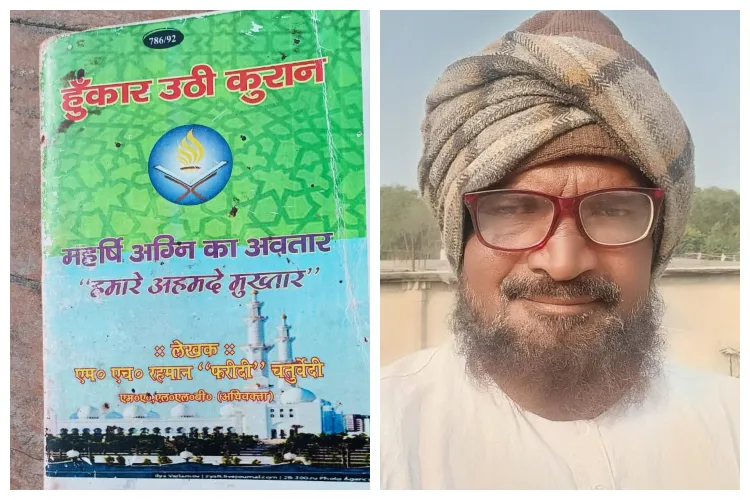
Sultana Parveen / Purnia
Mohammad Hafizur Rahman Faridi Chaturvedi’s book, Maharishi Agni ka Avatar: Hamare Ahmadey Mukhtar (The Avatar of Maharishi Agni: Our Ahmed-e-Mukhtar is based on a unique theme. Hafizur Rahman, a resident of Neerpur village of Purnia, Bihar, has written his experiences and observations after marathon research and study of many texts.
He had completed the book way back in 1985, but due to his financial condition, its publication was delayed. It was published after 15 years, in the year 2000. He could print only 2,000 copies of the first edition and despite the demand; the second edition is stuck due to a lack of resources.
Hafizur Rahman had always been fond of reading Sanskrit. He says Sanskrit is his culture; his father Mohd. Amaur Rahman was a great scholar of Sanskrit.
Hafizur Rehman has memorized Ramcharit Manas, the Story of Lord Rama written in Sanskrit. He used to call himself Hafize Ramcharit Manas (One who has memorized Ramcharitra Manas). His grandfather Ajbar Ali was also knowledgeable in Sanskrit.Seeing his knowledge of Sanskrit and his love for the language of ancient Indian texts, The Kameshwar Singh Mithila Sanskrit University conferred on him the title of Acharya. However, this created a controversy.
Ajbar Ali passed on his love of Sanskrit to his sons. He also started an institute to pursue Sanskrit, but due to lack of resources, it didn’t last long. Hafizur Rahman says, “if there was enough money, many more books would have been published by now. In the absence of money, Hamare Ahmadey Mukhtar has become the first and last book."
Hafizur Rahman has read many ancient Indian texts that are all in Sanskrit. He has also studied the four Vedas and Valmiki Ramayana. It was while studying these texts the idea of his book was born. He says, “When I decided to write this book on Maharishi Agni’s reincarnation, I studied more texts. I wanted to extract as much proof to support my idea as possible.”
His father Mohammad Ataur Rahman was the sarpanch of the village for 22 years and yet the family’s struggle with financial problems continued. In 1984, he even missed appearing in his matriculation examination as he didn’t have money to pay his fee for filling the registration form. He could write the examination only next year by raising money to pay his fees in time.
Also Read: 32 ex-diplomats question selective condemnation of hate-speeches
However, the lack of resources never diminished his enthusiasm. He completed his MA in both History and English. Later, he also completed his LLB degree and today he makes a living out of legal practice.
Hafizur Rahman says that he wrote stories, poems, novels, and many other books, but could not get them printed. As his house had no roof, many of his manuscripts got damaged and destroyed in rain. He has written more than 300 poems, a novel Mera Gaon, Mera Desh.
He asks when God is one, why there are there different religions. He also wrote a research-based book One God; One Religion on this theme. Again, the book never got published. Hafizur Rahman says that he studied the four Vedas for writing his book. He has studied 18 Puranas, 27 Suktas, 27 Niti, Mahabharata, Bhagwad Gita, and Valmiki Ramayana to write the book.
He has made his point by writing and interpreting Sanskrit shlokas in the book. He claims that the method of offering Namaz is written in the Gita.
He further says, “Namaz is a Sanskrit word which is made up of the combination of Namah and Aj meaning bowing the body before God. “This is prostration; this is sajda." He says, with Sanskrit shlokas, he has proved that Lord Rama and Lord Krishna had mentioned Prophet Mohammad.
Hafizur Rahman says that Vedic Sanskrit is for everyone. Everyone should read this language. This will end social discrimination, encourage mutual brotherhood. People should study Sanskrit to change the social and political environment in the country. Hafizur Rahman has lost eyesight in his one eye and it has hampered even his legal practice.
He somehow manages to draft the petitions. “However, it’s rare that I go for arguing cases in the court. The doctors have suggested eye surgery.” Again, due to lack of money, his surgery has been delayed. Just a few months ago he laid a roof over his house. He hopes that his manuscripts would be published by his children in the future.
